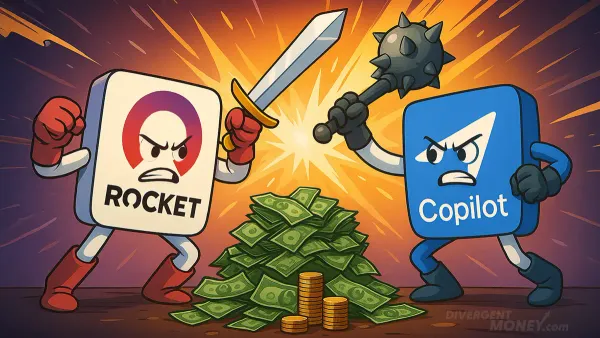The "Future You" Strategy for ADHD Brains

“It’s not that I’m bad with money. It’s that my brain forgets I was good with it until the overdraft alert hits.”
— Actual DM reader (used with permission)
Let’s be honest: Traditional budgeting advice doesn’t always work for neurodivergent brains—especially ADHD ones. We’re not lazy. We’re not irresponsible. We’re operating on a different operating system. And that means we need financial systems that don’t assume consistency, memory, or the ability to “just stay on top of it.”
That’s where the “Future You” strategy comes in.
This isn’t some productivity hack. It’s a whole financial framework designed for people who:
- Miss due dates even when they care
- Avoid opening bills because of anxiety
- Overspend during dopamine droughts
- Feel shame around restarting (again)
Let’s fix that—compassionately, creatively, and with backup plans.
Why Money Feels Harder With ADHD
Here’s what we’re really up against:
🧠 Impulse Control
The brain seeks dopamine. That “just one thing” Amazon cart is the reward.
🧠 Time Blindness
You know the bill is due next week… until it’s yesterday.
🧠 Decision Fatigue
Your brain’s been running a mental marathon. Now it wants a nap, not a Roth IRA.
🧠 Tracking Troubles
Spreadsheets feel like math punishment. Apps get opened once, then ghosted.
It’s not your fault. But it is your responsibility—and you can own it with the right tools.
Meet the “Future You” System: A Financial Safety Net That Thinks Ahead
Think of it like building a team of digital assistants, bank boundaries, and habit hacks that future you can rely on when present-you is out of steam.
Here’s how:
1. Automate Everything You Can
Automation is not just a time-saver—it’s a lifeline.
✅ Bills
- Autopay for all fixed bills
- Align payment dates with paydays
- Set up buffer accounts to avoid accidental overdrafts
✅ Savings
- Weekly auto-transfers—even $5 helps
- Use round-up apps for passive saving
- Set percentage-based rules (“Save 5% of every deposit”)
✅ Alerts & Reminders
- Use 2–3 layers: calendar, app, even sticky notes
- Create recurring voice reminders with Alexa or Google
2. Design Friction Into Impulsive Spending
Make bad decisions harder to make.
💡 Remove Saved Payment Info
Typing your card in again = built-in delay (and decision reevaluation).
💡 Use a “Spending Account”
Separate fun money from your bills and savings. Once it’s gone, it’s gone.
💡 24-Hour Rule on Purchases
Big splurge? Write it down. If you still want it tomorrow, go for it.
3. Build Redundancy Into Every System
ADHD brains need backup plans. One layer isn’t enough. Three is ideal.
🔁 Redundant Systems:
- Primary + secondary payment methods (debit and backup credit)
- Emergency fund + overdraft protection
- Alerts from your bank + Google Calendar + budgeting app
🔁 Tracking Options:
- App-based (YNAB, Monarch, Copilot)
- Visual boards (whiteboard trackers, magnetic charts)
- Weekly check-ins with an accountability partner or coach
4. Adapt to Brain Variability
There will be hyperfocus weeks. There will be shut-down days. Your system should flex with both.
🌀 Design Principles:
- Easy to restart without shame
- Visual, low-effort tracking
- Defaults that assume “low energy” mode
“I made a laminated checklist for ‘Overwhelmed Me.’ It’s got five steps. One of them is ‘Check if rent went out.’ It has literally saved me.” – DM Community Member
5. Nurture Emotional Safety Around Money
You are not your balance. But your relationship with money is shaped by emotion.
🧡 Emotional Financial Tools:
- Celebrate tiny wins (yes, paying that $8 bill counts)
- Set “no-shame” review days
- Use money journaling to track how finances feel—not just what they are
Bonus Round: ADHD Financial Future-Proofing Checklist
✅ Autopay for essentials
✅ Separate account for spending
✅ Emergency fund (start with $100!)
✅ Multiple reminders and trackers
✅ Remove saved cards from shopping sites
✅ One page “Financial Restart” guide for hard days
✅ Regular “Money Reset” rituals (Sunday night works well)
Building a Better Wold
This isn’t about being better at budgeting. It’s about building a world where your actual brain can succeed—especially when motivation, memory, or mood are missing.
Future You will thank you.
This is a love letter to neurodivergent financial resilience, not a one-size-fits-all solution.
Disclaimer: As ALWAYS, this article is for educational and motivational purposes and is not financial advice. Always consider consulting with a financial professional for guidance tailored to your unique situation.




